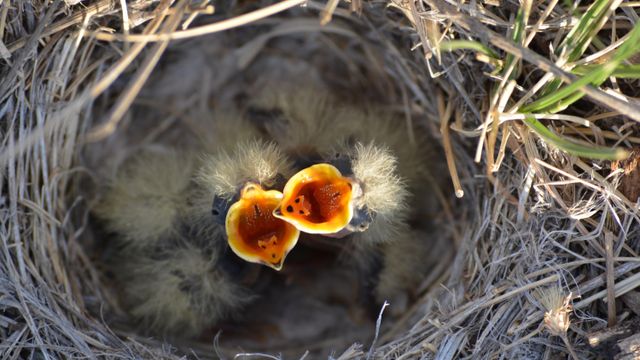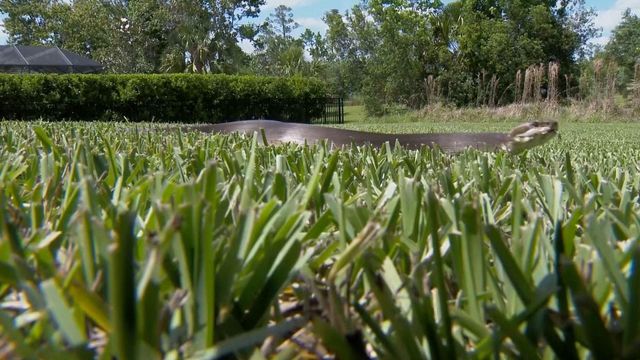Birds, bunnies, deer, raccoons, snakes: What to do if you see an animal in the wild
Seeing an animal in distress can make anyone feel helpless, but a North Carolina wildlife expert explains when you should, or shouldn't, intervene.
Posted — UpdatedIt happens more often in the spring and summer — you find a young bird or other creature that appears to be injured or abandoned. Seeing an animal in distress can make anyone feel helpless, but a North Carolina wildlife expert explains when you should, or shouldn't, intervene.
Falyn Owens, a biologist with the N.C. Wildlife Resources Commission, said it's almost always best to let things unfold naturally when you encounter a wild animal that appears to be in a predicament.
"If you find a wild animal and feel like human intervention is needed, you always want to get professional advice before doing anything," said Owens. "There are a lot of reasons why not intervening can actually be the best choice for the animal, and it's really hard for the average person to know the right thing to do without consulting somebody first."
Does this animal need my help?
Sometimes an animal may benefit from human intervention, but it can be difficult to know when to act. Owens listed the most common animals North Carolinians see in warmer months and what to do if you encounter one.
Birds
If you see a bird on the ground that clearly looks injured -- it can't put any weight on one of its legs or one of its wings looks mangled -- then you can reach out to a N.C. Wildlife bird rehabilitator for advice.
Rehabilitators are licensed to handle wildlife. They are aware of wildlife laws and trained to know what's best for the animal because, in the long run, the end goal is to get the animal back out into the wild to survive on its own.
"It takes a lot of experience to know how to take care of an animal without also making it dependent on humans for the rest of its life," Owens said.
N.C. Wildlife gets a lot of calls in the spring about birds, especially young fledglings that appear abandoned or in trouble. But, in many cases, unless it's obviously injured, it's best to leave a bird alone so it can learn what to do next.
"These are birds that are young and can't fly yet, but they have left the nest where they're kind of sitting ducks for predators," Owens said. "So before they can fly, they jump out. And they have to figure out how to fly. So they're hopping around on the ground and the parents usually are off looking for food."
People find young birds on the ground with no parents around and assume they were abandoned when, in reality, everything is normal, Owens said, adding, "The last thing you want to do would be to pick it up, put it into a box and try to take care of it, because you're actually interfering with that bird's life lessons."
In some instances, it may be appropriate to intervene. If you see a bird that appears newly hatched — it can't stand up and doesn't have its feathers yet — look around the immediate area. If you see the bird's nest, it's okay to carefully scoop the baby up with your hands and put it back in the nest.
Many of us have heard not to ever touch a bird's nest. We're taught that as children for a good reason, Owens said, but it's a myth that parents won't return to the nest if they smell a human's scent.
"It's always good advice to get people to stand back and admire wildlife from a distance and not intervene," Owens said. "But the funny thing is, birds don't even really have a sense of smell at all. Songbirds literally don't even have a space in their brain devoted to smell. They would have no idea if a human being had touched one of their young. The parents don't care. They just want their baby back."
Bunnies/rabbits
Just like birds, it's very common to see rabbit nests in the spring and summer. Rabbits nest in the ground in shallow depressions, and the mother only visits the nest once or twice a day for a few minutes at a time, Owens explained. If the mother is close to her nest, she is calling attention to it and could attract predators.
The takeaway message remains. Unless an animal is injured, leave it alone.
"People find rabbit nests and they don't see the parents around and they assume the nest has been abandoned," Owens said. "But seeing a rabbit nest with lots of little fluffy babies in there tucked away with no mother around is actually perfectly natural, and there's no reason to assume anybody has been abandoned."
Deer
N.C. Wildlife also gets a lot of calls about newborn fawns this time of year. Deer only give birth once a year, usually in May, June and July.
"They kind of all give birth at once here in North Carolina, and when they're first born, they're really weak," Owens explained. "They can stand and walk, but not very well at first. They just hide while mom goes off and does her thing. She goes and finds food and she drinks from a local stream. She knows that her fawns are tucked away safe somewhere, not moving, just trying not to be seen."
Sometimes people will find a fawn alone in an urban area laying quietly with no mother, or doe, around.
"They assume that the fawn has been abandoned, but usually that's the exact opposite," Owens said. "It all boils down to don't do anything immediately. Don't take any action, go and find more information from a professional or a website first, because doing something right away can hurt the animal in a lot of cases."
Raccoons
Raccoons are a species known to carry rabies, but it's a myth that a raccoon has rabies if you see it in the daytime. Still, if you see one, give it space.
"Seeing raccoons in the daytime awake is pretty normal across the board, because just like people get up in the middle of the night to have a midnight snack or go to the bathroom, wild animals do the same thing," Owens said. "If it's aware of its surroundings and is looking for food or something like that, it's probably healthy."
You may see more raccoons in the daytime during the spring and summer because they're raising young.
"If anybody has ever had a very young child, like a baby or toddler, they don't have very good sleep schedules yet," Owens said. "You are awake day and night taking care of them. And that's the same for wild animals."
If you see a raccoon that appears to be stumbling, having seizures or experiencing a neurological issue, give that animal a wide berth. If a person or pet has been scratched or bitten, it's time to call your local health department or animal control.
If a raccoon or another wild animal is in your home, you want to figure out how it got there. Professional wildlife control services can remove wildlife and help figure out what's going on prevent the problem from happening in the future.
Raccoons and other animals are very food focused, Owens said, so make sure pet food isn't left outside. Bird feeders or compost piles can also attract wildlife.
Snakes
"Even then, across the board, snakes don't like to bite people," Owens said. "They do it out of self-defense because they feel like they have no other choice. Trying to kill or handle a snake is usually when people get bitten.”
People can make their yards less desirable for snakes by keeping them free of clutter, including trash, sticks or rock piles. Keep your lawn mowed and close any gaps in your home's siding or foundation. You can also seal openings under doors, windows and around water pipes.
"Keeping a manicured lawn is really good for keeping snakes and rodents from making a home right next to your house," Owens explained. "Snakes often are looking for rodents, and tall grass is great habitat for rodents, mice and rats."
If you wish to remove a snake from your yard, you can use a water hose to gently spray it and encourage it to leave. Never kill a snake, because they are an important part of our ecosystem.
Coyotes and foxes
N.C. Wildlife also gets many calls about coyotes and foxes in the Triangle in the spring and summer.
"Usually when people call us, they're worried that the animal might be dangerous," Owens said. "They're worried that it could potentially have rabies and be a danger to the neighborhood. But usually these animals are not going to cause any kind of harm or damage as long as they're outside."
The best thing to do if you see a wild animal, even in the daytime, is watch it from a distance.
"It just means that they happen to have a good reason to be awake," Owens said. "Whether it's a coyote or fox or raccoon, the best thing you can do is just appreciate it, leave it alone and let it do its thing."
Dogs and cats
They're not wildlife, but many of us have seen dogs or cats that appear to be strays or even injured by a passing car.
There's a huge difference between who handles domestic animals and who handles wildlife, Owens explained. If you see a stray cat or a dog outside, whether it looks injured or not, and the owner isn't around, animal control is your best resource.
What to know about animal bites and rabies
In N.C., foxes, raccoons, skunks and bats are the animals most likely to contract rabies. Bites from wild animals are fortunately rare, Owens said. But if someone is ever bit by a wild animal, they should seek help. Animal control handles bites involving a rabies vector species.
"If someone gets bitten by one of those animals, call 911, and they'll get you in contact with the right people," Owens said. "Usually the county health department is going to get involved to test the animal or pet to see if rabies treatment is needed."
Helpful links and numbers
- Get help for wild animal bites: 911
- Worried about a wild animal? N.C. Wildlife Helpline: 866-318-2401
- Interactive map: Find a wildlife expert near you
- Identify snakes online
- Helpful info about wild animals
- Raleigh Animal Control: 919-831-6311
Related Topics
• Credits
Copyright 2024 by Capitol Broadcasting Company. All rights reserved. This material may not be published, broadcast, rewritten or redistributed.






